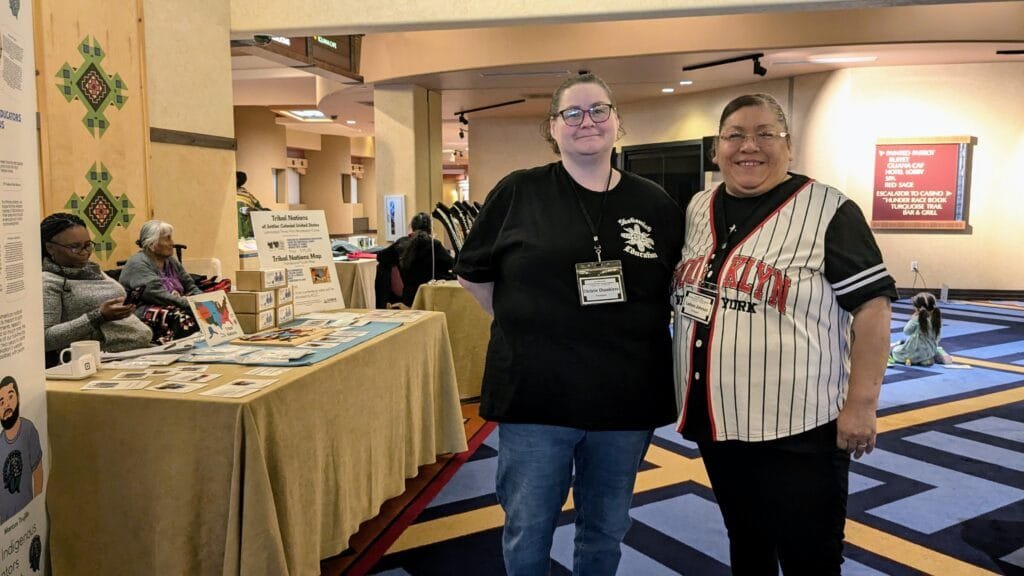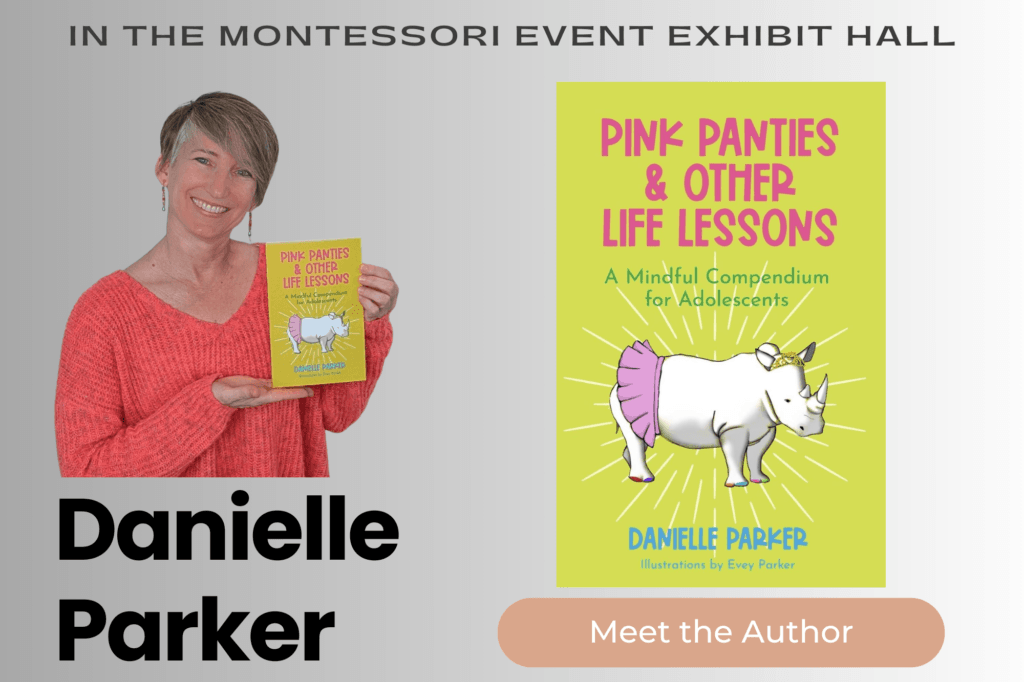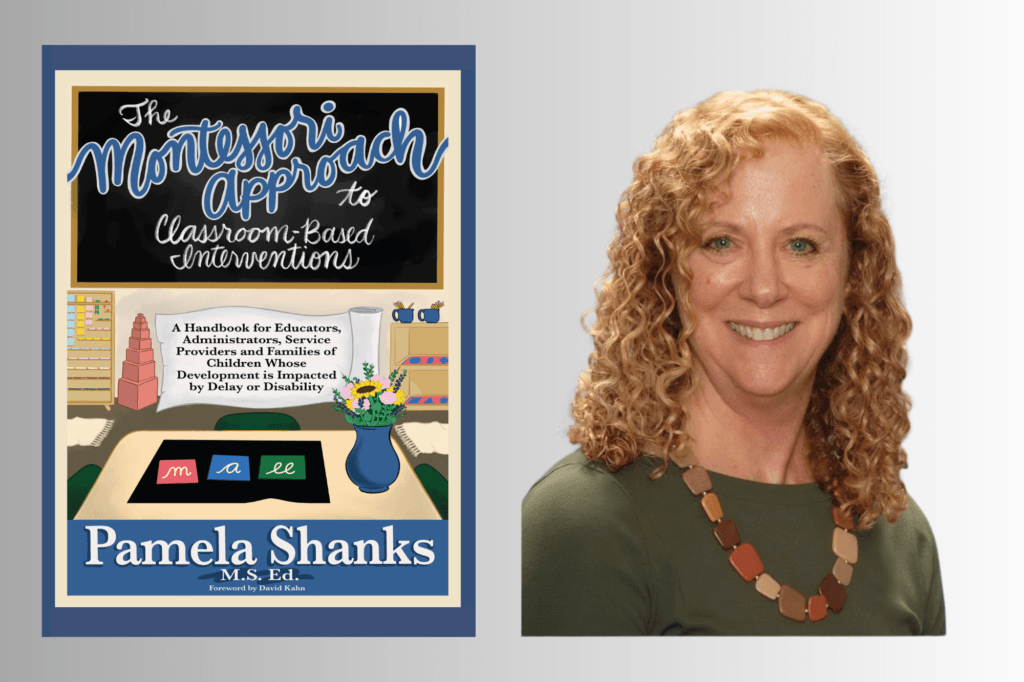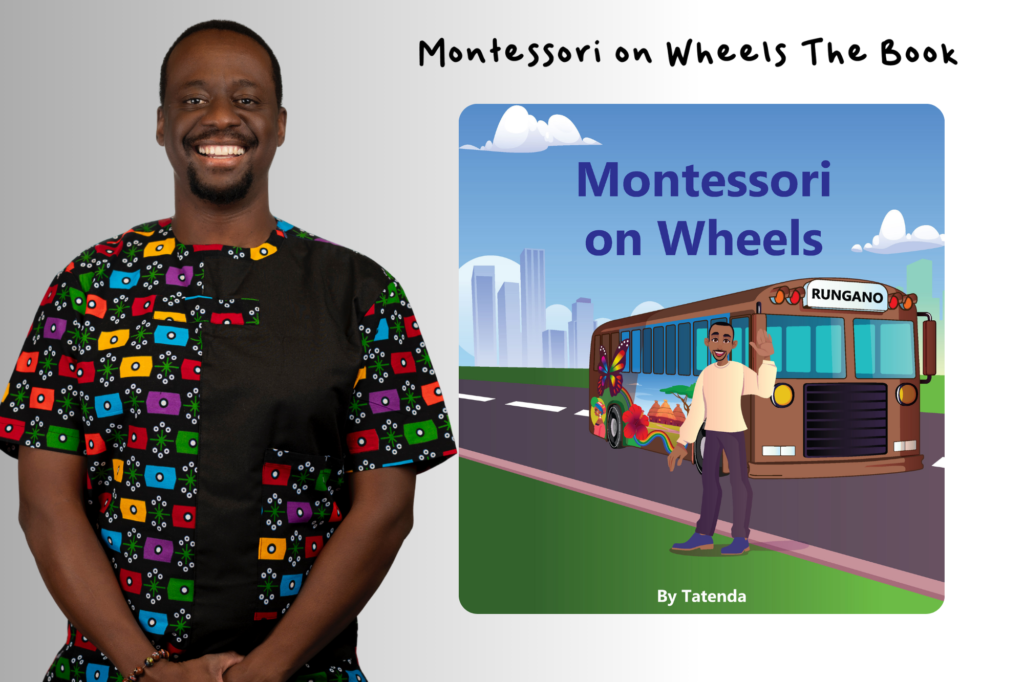Highlights from the 8th Annual Native Language Symposium: Bridging Indigenous Language, Values, and Montessori Education

November 2024, Santa Fe, New Mexico — The 8th Annual Native Language Symposium commenced with breakfast and prayer at the Buffalo Thunder Resort. The gathering connected educators, language revitalizers, and community members interested in language immersion and Montessori education.
Leroy “Buster” Silva, event MC and community mover and shaker from the Pueblo of Laguna, started the morning by reading the mission of the Indigenous Montessori Institute (IMI): “The Indigenous Montessori Institute is an anti-racist, anti-biased approach to education using Indigenous knowledge systems and the Montessori Philosophy to deliver teacher training.”
Emphasizing the importance of language preservation and Montessori education, Buster encouraged participants to forge meaningful connections throughout the symposium.
Heartwarming videos from the Keres Children’s Learning Center (KCLC) followed and Trisha Moquino (Cochiti, Kewa, and Ohkay Owingeh) took the stage, urging attendees to disrupt colonial thinking.
“Colonialism taught us not to trust children,” she stated, prompting the audience to reflect deeply.
She described KCLC Montessori classrooms equipped with real pottery and glassware, illustrating the responsibility and trust placed in young children. Waving to her mother seated in the crowd, Trisha spoke about KCLC, the Keres Language Immersion Montessori school she founded in 2006.
When they started KCLC, they learned from the Māori, Taos, Blackfeet, and Hawaiian communities. Today, many language immersion schools follow the KCLC Montessori model. Trisha concluded her speech with a powerful reminder: “There are no guarantees. Our job is to do our best.”
Connecting Communities Through Language and Education
Participants from across the nation attended the symposium. LaDean Johnson from the Skokomish Indian Tribe came to connect with fellow educators and experts. Her great aunt passed in 1978 and was the last native speaker of her ancestral language, Twana.
LaDean now works to restore the language. “I wanted to learn the language so when I am called home, I can speak with my ancestors,” she shared.
LaDean works alongside her cousin, Christie Chambless. They attended the symposium with their uncle, together they are preserving their ancestral language and culture through the Twana Language Project.
Christie echoed her cousin’s heartfelt sentiment: “I wanted to learn so I could pray in my own language, to my ancestors,”

Christie Chambless and LaDean Johnson travelled from the Pacific Northwest, to New Mexico, for the Native Language Symposium
Melissa Yepa from the Pueblo of Jemez won the Tribal Nations Montessori three-part card and wooden puzzle map giveaway. “I’m very excited to have won this Tribal Nations pack. I learned of the new resource that is now available to us as Native teachers. I am definitely using this in my elementary classroom. This will open the eyes of our students.”
She emphasized the symposium’s value: “It’s just the first day, and there’s already been a lot of information packed into today’s session. There are great resources and valuable insights. As tribal language immersion teachers, we face many obstacles and challenges within our communities, but symposiums like this give us that extra reinforcement.”
The Tribal Nations Montessori Three-Part Cards are sold by Montessori Services and were created by Trisha Moquino (Cochiti, Kewa, and Ohkay Owingeh), and illustrated by Marcus Trujillo (Pueblo of Laguna). The Tribal Nations Wooden Puzzle Map is produced by Mirus Toys.
Children played in the halls, and the symposium was filled with joy, yet, there were somber moments of reflection. Abby Arquero, a local educator and elder from the Pueblo of Laguna, looks forward to the symposium every year and is always excited to learn about all the Tribes and efforts to revitalize language and culture. She acknowledged the genocide Tribal Nations have survived, “They tried to eliminate our identity. They wanted to erase us. But we’re the rightful inhabitants of this land.”
She expressed a profound joy in contributing to the symposium, which her daughter helped organize. She was hopeful about the work of community members.
Community Leaders Sharing their Wisdom and Expertise
Shannon Chapman, a member of the Menominee Indian Tribe, shared how a visit to a Montessori school left a lasting impression and would eventually lead to Kaehkēnawapahtāēq, a Montessori language immersion school in the Menominee Nation. They began working on their first classroom in 2017. Shannon believes that Montessori Cosmic Education —the idea that all things are interconnected and everyone has a particular cosmic task—is compatible with Indigenous values and wisdom.
“The children are the center of this universe,” Shannon explained to a packed hall while elaborating on the virtues of Montessori education. “The multi-age classrooms allow older children to teach younger ones. The learning is self-driven. Materials are engaging and fun, sensory-based, and they give students the ability to self-correct. You don’t have to tell them they’re doing something wrong; they can figure it out on their own. Students engage in real-life, purposeful learning.”
Looking ahead, she shared plans to expand their language school from early childhood to lower elementary and eventually middle school.
“We continue to provide support and training to increase language fluency and aim to partner with the College of Menominee Nation to create a training program for language-speaking Montessori educators. It requires focus and dedication. When times get tough, I often feel the spirit of our ancestors pushing us forward. This was their dream. It’s up to us to perpetuate it.”
On day two, the Symposium concluded with Marcus Briggs-Cloud, a Mvskoke language revitalizer, scholar, and musician, who acknowledged the compatibility of Montessori education and Indigenous wisdom. However, his students experience education in a more natural “classroom” environment—the outdoors.
He addressed the challenge of language obsolescence—how can ancient languages express modern ideas and concepts that never existed in the past, and if a language does not change and adapt, how can it survive?
While some linguists suggest forming committees to create new words, Marcus was concerned about losing the essence of his language. Instead of transforming the language, he transformed the environment. His tribe purchased land and established: “Ekvn-Yefolecv (ee-gun yee-full-lee-juh) an intentional ecovillage community of Indigenous Maskoke persons who, after 180 years of having been forcibly removed from traditional homelands – in what is commonly/colonially known as Alabama – have returned for the purpose of practicing linguistic, cultural and ecological sustainability.”
In this ecovillage residents live symbiotically with all living beings in the ecosystem and speak their ancestral language without needing to modify it too much. Centered on language, culture, health, and nature, the community is self-sustaining. They enjoy healthy, organic meat and produce grown on their land and continue to acquire more land to steward responsibly. When members of his tribe come to live in the ecovillage they often experience an increase in health and wellness.
His young daughter took the stage, speaking only Mvskoke for several minutes. Raised in Ekvn-Yefolecv, she does not speak English yet. In many ways she embodies the hopes and dreams of her father and the audience.
After his daughter spoke, Marcus returned to the microphone and shared the two rules of the ecovillage: “No English, and you have to have a lot of love in your heart.”
As the 8th Annual Native Language Symposium came to a close one thing was sure. the participants left with love in their hearts that will propel language revitalization and influence generations to come.
Resources:
The Indigenous Montessori Institute (IMI)
Kaehkēnawapahtāēq, a Montessori language immersion school in the Menominee Nation
For suggestions or corrections please email Joe directly at joe@learningsunshine.org





Responses